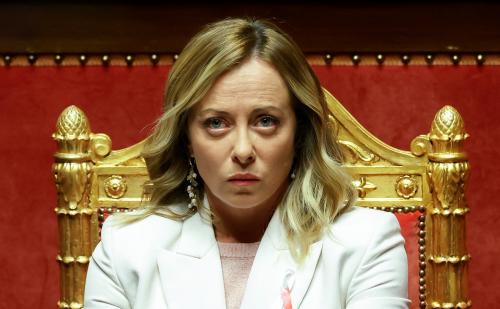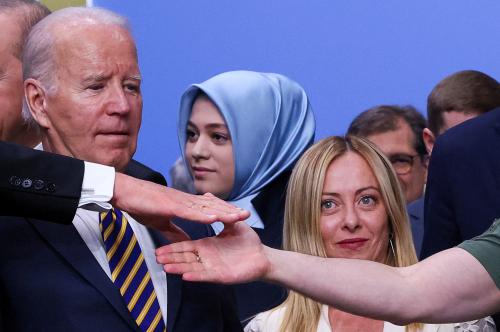On February 7, Foreign Policy at Brookings hosted former Italian Prime Minister Paolo Gentiloni for an Alan and Jane Batkin International Leaders Forum. Gentiloni served as prime minister of Italy from December 2016 to June 2018 and recently joined Brookings as a distinguished fellow in the Foreign Policy program.
In a keynote address, Gentiloni discussed the growing phenomenon of national populism, Italy’s role in an evolving Europe, and the trajectory of the trans-Atlantic alliance, drawing from his decades of experience in national and local politics, including terms as Italian minister of foreign affairs and minister of communication. Following the speech, Brookings Senior Fellow and Director of the Center on the United States and Europe Thomas Wright joined Gentiloni on stage for a conversation on these themes.
National populism: A new political wave
https://www.youtube.com/watch?v=iAH5nSxOvO4?start=286&end=656
Globalization has not only been “unable to guarantee economic wealth” but also “threatens our own identities,” Gentiloni said in his opening remarks. By evoking themes of anti-elitism and nostalgia for the past, as well as protectionism and isolationism, new national populist forces have been able to ride the “new political wave.” Their success is also, to a large extent, result of a growing narrative of identity fear and social anger, Gentiloni explained. At the same time, traditional parties on the center-left and -right have failed to detect and respond to signs of political change.
In addition to social hardship, xenophobia, and protectionist reactions, the crisis of globalization has also produced another core challenge: anti-democratic contagion. Gentiloni noted in his remarks that it is the first time we are experiencing a decline in the confidence of the unlimited spread of liberal democracy. “Multilateralism, free trade, environmental sustainability, welfare, and freedom are [all] at risk,” he warned.
Asked by Wright about the future of the European left, Gentiloni stressed the importance of learning lessons from past electoral defeats, and challenging the narrative of illusion and fear. Striving for a more competitive, innovative, and sustainable economy should be at the core of European left parties’ agendas, he noted. “We cannot just repeat the old-time recipe of overture of openness,” he explained. While populist parties are asking the “right questions” about job security, identity, and other themes, Gentiloni contended that the onus is on the traditional left to provide the right answers. He cautioned that unless these traditional political groups present a credible alternative to the image of unrestrained cosmopolitan elites, they would inevitably face new and greater losses.
On trans-Atlantic relations
https://www.youtube.com/watch?v=iAH5nSxOvO4?start=773&end=999
Gentiloni emphasized that the revival of Western values—now seemingly in retreat—is more crucial than ever before. “In the post-war era, the trans-Atlantic relationship was not just a military alliance or a bulwark for the free market; it was also the main engine to promote liberal democracies,” he explained. In the absence of common principles, it would be increasingly difficult for both sides of the Atlantic to resolve disputes over trade or identify shared geopolitical interests to confront rising powers such as China.
Discussing the role of NATO, Gentiloni argued that “it is key to look beyond the surface.” He said that the U.S. call to allies to contribute more on defense is “understandable” but “not conclusive.” He clarified that some member states, such as Turkey, do relatively well on military spending but often do not act for the common interest of the alliance (note: Turkey still falls short of the 2 percent threshold NATO countries have agreed to). Meanwhile, other member states, such as Italy, are still lagging behind in terms of expenditure figures but are certainly more involved in shared operations—ranging from Afghanistan to Iraq to Kosovo. Gentiloni urged the Italian government to strengthen its mutual engagement to reaffirm the role of NATO and to support European integration on defense.
Asked by Wright about the effects of Brexit, Gentiloni argued that both the United Kingdom and the European Union will suffer significant losses. He noted that the U.K.’s economic and financial positioning within the EU, its traditional geopolitical influence, and its culture are key factors that mark this development “the most catastrophic” in post-war Europe. He also praised EU chief Brexit negotiator Michel Barnier for keeping the remaining 27 member states well-informed and united during the negotiations.
A “populist tsunami” in the upcoming European elections?
https://www.youtube.com/watch?v=iAH5nSxOvO4?start=1410&end=1652
Gentiloni noted that the upcoming European Parliament elections in May will be “a moment of truth for the challenge against national populism.” However, he rejected the possibility that Europe would see a “tsunami” of populism that would meaningfully disrupt the political balance in the parliament. “Forces aligned with national populism will probably reach about 10 to 15 percent of the votes,” he predicted. The new leadership of European institutions—including the presidents of the European Commission, Council, and Parliament—will maintain their traditional orientation, according to Gentiloni. Moreover, he expressed his confidence that the Italian case will remain rather isolated.
Gentiloni’s main concern, however, lies in the influence national populist forces will have in the functioning of European political systems. The European Commission will have at least three or four members nominated by nontraditional governments, who will have a completely different view of Europe than the rest of their colleagues, he explained. “Take note on this because it will really be a premier, it has never been so…for the first time it will be a challenge on the future of Europe,” Gentiloni warned.
Sarah Barth contributed to this post.
The Brookings Institution is committed to quality, independence, and impact.
We are supported by a diverse array of funders. In line with our values and policies, each Brookings publication represents the sole views of its author(s).






Commentary
Paolo Gentiloni on the populist challenge in Europe
February 14, 2019